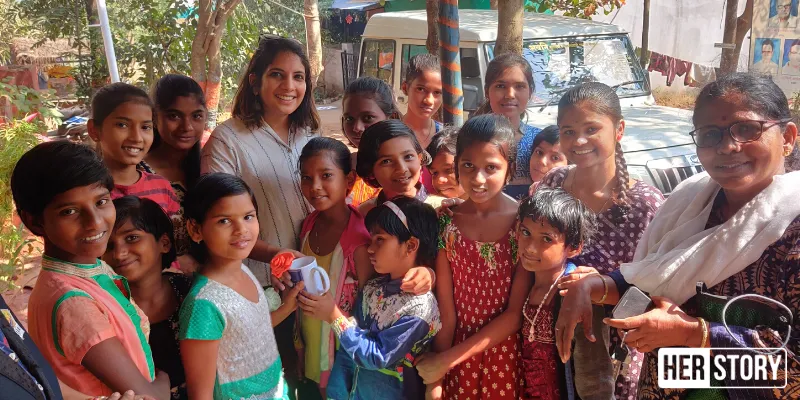This programme is helping women leaders in Maharashtra advance economic empowerment
The Collective Impact Partnership — an effort led by Rise Up, How Women Lead, the Public Health Institute, Global Fund for Women, and World Pulse — is empowering women leaders in Maharashtra to advance economic empowerment.
According to the Economic Survey 2020, female labour force participation in India fell to 25.3 percent in 2017-18 from 33.1 percent in 2011-2012, indicating that close to 75 percent women in the country wield negligible or no economic power.
Economic power is one of the key factors that can help women attain freedom and empowerment. And to improve this situation, the Collective Impact Partnership (CIP) — a collaborative effort between non-profits Rise Up, How Women Lead, the Public Health Institute, Global Fund for Women, and digital social network for women changemakers World Pulse — is working to help women leaders in Maharashtra with advocacy, individual leadership, and digital capacities to advance economic empowerment and justice for women and girls.

Nikita Wadhwa on ground working with women and girls.
Launched in 2018, the programme was the brainchild of five women leading these organisations — Denise Dunning from Rise up, Jensine Larsen from WorldPulse, Musimbi Kanyoro from Global Fund For Women, Mary Pittman from Public Health Institute, and Kathy Crowley from How Women Lead.
At the helm of CIP are two women — Laila Mehta in the US and Nikita Wadhwa in India.
After research, the programme zeroed in on the state of Maharashtra to begin the work as it had context for equitable economic growth. It found that the state also fostered established women's groups.
The programme was open to leaders of women’s organisations and through applications and interviews, it shortlisted leaders and selected them based on their digital capacity and experiences with advocacy and economic empowerment. It ended up with a diverse cohort of women leaders across urban and rural spaces across 20 districts.
A grassroots movement
The CIP’s approach helps civil society leaders and organisations working at the grassroots to enhance economic power and justice for women and girls. The programme’s advocacy and leadership development training focus on helping women bring in policy level changes to affect institutional change.
It also provides advocacy and leadership development training to grassroots women leaders to advance public policies that enhance economic empowerment for women and improve implementation of existing legislation to enhance economic justice and empowerment.
CIP is supported by a grant of $2.1 million from The Bill & Melinda Gates Foundation.
Programme Manager Laila works closely with Programme Coordinator Nikita to ensure that the needs and strengths of the women leaders are utilised in the planning and implementation. Additionally, Nikita trains these women leaders to help them create and achieve specific goals of policy engagement.
The work of women leaders
“Women’s economic empowerment at the grassroots is hindered by a lack of enabling environment and a lack of suitable employment opportunities available to women. Through CIP, we’ve supported grassroots women leaders in building their leadership and providing them with skills, tools, and resources to address the context and environment,” says Nikita, who shifted from advertising and consulting to work with women and youth rights and their increased participation in economic and public spaces.
As part of the CIP programme, women leaders work on a gamut of women-centred issues, such as increasing ownership of assets by women in agriculture, addressing gaps in labour rights for women workers, making university spaces accessible and safer for women through the implementation of policy for the prevention of sexual harassment (POSH), building gender budgeting skills among women for improved budget accountability, and projects that identify barriers to workforce participation for women from minority communities.
One such woman leader is Anuradha Bhonsale from non-profit Avani in Kolhapur. She works with a particularly disadvantaged group of women — waste pickers. Her work has resulted in increased recognition and dignity of these women in waste-picking work. Now, she is working towards their formal employment in waste segregation work at municipalities. In fact, municipalities have approached the organisation to prepare plans of integration of the waste pickers into formal employment at the municipality.
Another exemplary set of women leaders at the Mahila Rajsatta Andolan work with women in panchayats. Their increased awareness of skills of policy engagement and analysis helped them recognise the discrepancy between the honorariums offered to male and female Panchayat members. They were soon able to advocate for an increase across the 20 districts they are working in. Now, they are working on building skills and systems of budget accountability across Panchayats so that budgets can respond to women’s needs.
The programme has achieved several goals, including an increase in the number of women holding joint titles on homes and agricultural land with their partners, increase in the number of established and functioning Internal Complaints Committees (ICC) in universities for POSH, and improved dignity of women in waste picking work in certain municipalities and more.
“I have seen a change in how the leaders express themselves with more confidence and clarity, and how they rely on each other for support, inspiration, and ideas,” says Laila, who extensively worked on women’s rights, racial justice, and immigrant and migrant rights internationally, and in the US for over two decades.
Continuing the work during the pandemic
The coronavirus pandemic has affected several communities and further put into risk the economic ability of women who do not have access to formal work. Nikita says that the leaders have been able to come together using technology and digital tools and propose several relief measures for women that are particularly disadvantaged and affected across the state.
They are advocating for specific measures to alleviate women’s economic distress and issues that will affect girls and women in the coming months, such as reduced livelihood and the lack of emphasis on girls’ education and nutrition for women.
Apart from ensuring key relief measures such as access to food and ration, the group has collectively drafted a demand charter for the state government to address specific issues that affect women. Some demands offer solutions on how to use existing policies such as the Mahatma Gandhi National Rural Employment Guarantee Act and the National Rural Livelihood Mission to support women who are affected.
The CIP leaders are taking care of their community members and the most vulnerable groups, such as nomadic tribes, migrant labourers, and single women while working with local governments to address gaps.
Affected by the pandemic, the women leaders have made the use of the social network World Pulse to stay connected online. Even though their focus has shifted a little, Nikita says, “We’re still focussing on our goal of increased economic rights for women in Maharashtra, a little differently.”
She adds that the next step would be to expand the model of Collective Impact to other states and build on the idea of collaboration being a key component to amplify the work women do to achieve meaningful policy goals of economic empowerment.
The team would also like to work to support women working across themes as economic empowerment intersects with themes like women’s education and health.
Edited by Saheli Sen Gupta




![[National Girl Child Day] How this organisation aims to help girls achieve their full potential](https://images.yourstory.com/cs/4/7951d870deb311e98c337d64c472c4c1/Imagek716-1579779429976.jpg?fm=png&auto=format&h=100&w=100&crop=entropy&fit=crop)




